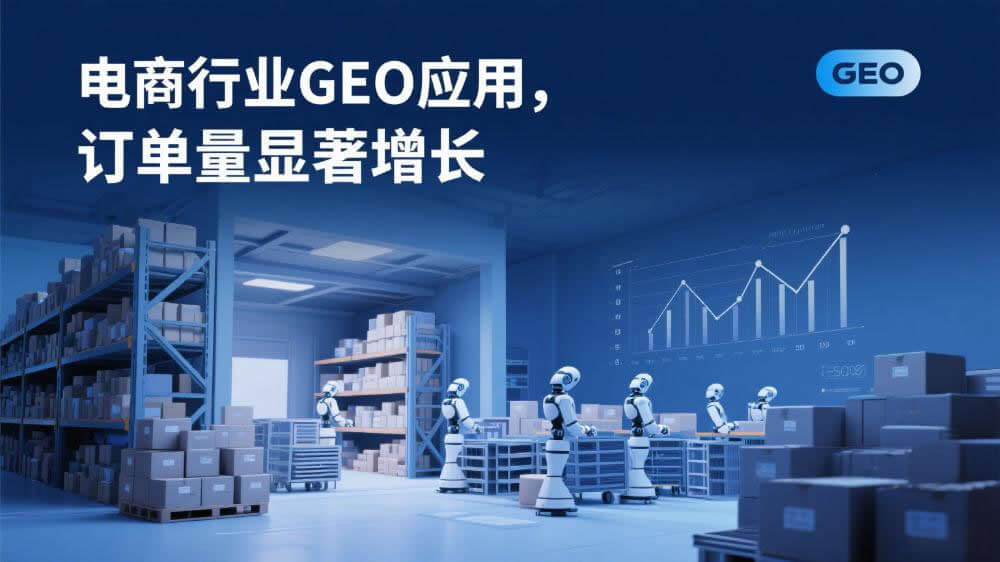GEO Success Cases: Industry Applications and Performance Analysis

In the AI-driven information age, Generative Engine Optimization (GEO) is transitioning from concept to practice, demonstrating disruptive impact across multiple industries. Through carefully optimized content, brands can not only achieve unprecedented exposure in AI-generated answers but also effectively improve user conversion rates and engagement, capturing the traffic entry points of intelligent conversations. The following industry application cases provide in-depth analysis of how GEO helps businesses achieve growth.
Industry Application Cases
Case 1: Retail Industry - Achieving Precision Reach and Sales Growth
Through GEO optimization, retail brands can better meet consumers' growing demand for "contextualized, intent-based" queries requiring structured and semantic product content expression. For example, an e-commerce platform deeply optimized product descriptions by adding detailed features, usage methods, and user reviews, while creating numerous FAQ pages specifically addressing product inquiries on AI platforms. Technically, the platform used Schema.org for precise product information markup and pushed real-time updates to AI platforms via API interfaces. They also analyzed user behavior data to identify key decision-making questions and highlighted this information in content to guide user queries.
After implementing GEO optimization, the retail brand's product information citation rate in AI-generated answers increased by over 50%. As AI could provide more accurate and detailed product information, the platform's conversion rate improved by 20%. Brand awareness also significantly increased, attracting more new users. This aligns with another case where a home goods brand achieved over 30% growth in AI traffic share through structured product introductions, FAQs, and llms.txt files.
Case 2: Tourism Industry - Enhancing Visibility and Driving Booking Growth
The tourism industry also benefits greatly from GEO. In the AI era, users no longer just input keywords but ask questions in natural language, often including context and scenarios. For instance, regarding "New York tourist activities," after GEO optimization of a travel website's content, AI answers began prioritizing the website's featured experiences. This demonstrates how optimizing content to align with AI's semantic and intent understanding can significantly influence AI answer focus.
The travel brand achieved this by:
- Building hierarchical content covering various travel scenarios and user intents, such as creating content for "college couples visiting Japan on a ¥20,000 budget."
- Adopting Q&A-style, step-by-step content structures with multimedia integration, helping AI better grasp content context and application value.
- Continuously updating content to maintain timeliness, meeting AI's preference for fresh, accurate information.
Ultimately, the travel brand achieved 40% higher exposure in AI search engines and substantial growth in customer engagement. Similarly, a Huangshan homestay optimized "Huangshan travel accommodation" keywords through GEO, adjusting content publishing schedules according to peak seasons, maintaining top-5 rankings on Baidu and achieving 80% booking growth during peak seasons.
Performance Analysis
These industry cases clearly demonstrate that effective GEO strategies deliver significant multi-dimensional results:
- Higher exposure and AI citation rates: GEO's core objective is making brand content part of AI-generated answers or authoritative references. Cases show optimized content can achieve 50-60%+ citation rate increases on AI platforms. This "being cited" rather than "being found" strategy effectively intercepts traffic as AI search becomes the new "search homepage."
- Improved sales conversion and customer acquisition efficiency: When AI provides integrated answers embedding brand information, users get decision-making information without clicking original links. This "zero-click" answer format, with its immersive and personalized nature, significantly enhances user trust and acceptance. Practice shows GEO-optimized content can reduce customer acquisition costs by 60% compared to traditional SEM while tripling conversion rates.
- Enhanced user engagement and brand authority: High-quality, structured, semantically rich content better responds to users' deep intents and diverse questions. When AI frequently and accurately cites brand content, it implicitly endorses the brand, accelerating its establishment as a "knowledge benchmark" in users' minds, thereby boosting authority and credibility.
These success cases collectively reveal a core trend: In the AI-dominated new search era, content structuring, semantic optimization, and authority building are key to being "adopted" and recommended by AI. Businesses must shift focus from traditional "keyword stuffing" to "understanding user intent and building AI-trusted knowledge bases." Only then can brands become the preferred lighthouse when AI "navigates" for users, rather than passively waiting to be discovered in the information "deep sea."
Dr. Xin(David) Shuai: A "National Leading Talent" in the field of artificial intelligence. He holds a Ph.D. in Informatics from Indiana University, USA, with 15+ years of R&D experience in AI and NLP. A foundational researcher of the Altmetrics academic social media influence index; published 20+ academic papers, ranking in the top 1% in the field by citation count (over 1,100 citations); holds 4 AI technology patents; awarded champion in a government data competition by the U.S. Department of Commerce and the Census Bureau.